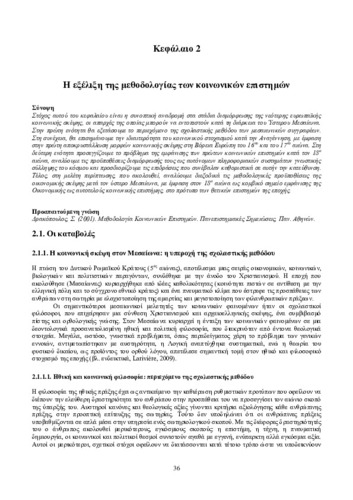| Title Details: | |
|
The development of social science methodology |
|
| Authors: |
Drakopoulos, Stavros Gkotsis, Georgios Grimani, Aikaterini |
| Reviewer: |
Zoumpoulakis, Michail |
| Subject: | HUMANITIES AND ARTS > PHILOSOPHY > PHILOSOPHICAL DISCIPLINES (EXCEPT ETHICS) > PHILOSOPHY OF SCIENCE LAW AND SOCIAL SCIENCES > ECONOMIC SCIENCES > HISTORY OF ECONOMIC THOUGHT, METHODOLOGY, AND HETERODOX APPROACHES HUMANITIES AND ARTS > HISTORY > SPECIALIZED HISTORIES > HISTORY OF SCIENCES AND TECHNOLOGY |
| Keywords: |
Methodology Of Economics
History Of Economic Thought Philosophy Of Social Sciences |
| Description: | |
| Abstract: |
Εμφάνιση των κοινωνικών επιστημών. Τα κύρια μεθοδολογικά ρεύματα του 17ου αιώνα. Οι απόψεις των Hobbes και Locke. Τα κύρια μεθοδολογικά ρεύματα του 18ου αιώνα. Γαλλικός διαφωτισμός. Laplace, Helvetius La Mettrie, Rousseau. O Saint-Simon και η φύση των κοινωνικών φαινομένων. Σκωτικός διαφωτισμός και ο εμπειρισμός του D. Hume. Τα κύρια μεθοδολογικά ρεύματα του 19ου αιώνα. Ο J. S. Mill και η μεθοδολογία των κοινωνικών επιστημών. H επίδραση της μεθοδολογίας των φυσικών επιστημών. Ο θετικισμός του Comte. Oι ιδέες για την μέθοδο των κοινωνικών επιστημών των K. Marx, H. Spencer, E. Durkheim, M. Weber, V. Pareto.
|
| Table of Contents: |
2.1. The origins
2.1.1. Social thought in Medieval: the scholastic method 2.1.1.1. Moral and social philosophy: the content of scholastic method 2.1.1.2. The applications of the scholastic method: the explanation of social phenomena 2.1.1.3. The applications of the scholastic method: the explanation of economic phenomena 2.1.2. The social thought in Byzantium: practical and empirical aspects 2.1.3. The socio-political thought of Renaissance: the emphasis on the methods of humanistic studies 2.1.4. The social thought in North Europe: ethical and moral aspects 2.2. The current social sciences: the effect of positive sciences 2.2.1. The effect of natural sciences 2.2.2. The effect of positivism 2.2.3. The effect of biology 2.2.4. The quest for historical laws 2.2.5. Conclusions 2.3. Case study: the method of Economics as an emerging social science in modern age (15th – 18th century) 2.3.1. The economic thought in late Medieval 2.3.2. Mercantilist economic thought: empirical methods and practice 2.3.3. The School Commercialism: new emphasis on empirical method 2.3.4. The criticism of mercantilist system: the first deductive rationalization 2.3.5. The transitional period: deductive and empirical method aspects and systematic theories 2.3.6. The deductive method of the Physiocrats 2.4. Conclusion References Evaluation tests Questions Answers |
| Linguistic Editors: |
Katseli, Ioanna |
| Technical Editors: |
Tsaknis, Antonios |
| Type: |
Chapter |
| Creation Date: | 2015 |
| Item Details: | |
| License: |
http://creativecommons.org/licenses/by-nc-sa/3.0/gr |
| Handle | http://hdl.handle.net/11419/1878 |
| Bibliographic Reference: | Drakopoulos, S., Gkotsis, G., & Grimani, A. (2015). The development of social science methodology [Chapter]. In Drakopoulos, S., Gkotsis, G., & Grimani, A. 2015. METHODOLOGY OF SOCIAL AND ECONOMIC SCIENCES [Undergraduate textbook]. Kallipos, Open Academic Editions. https://hdl.handle.net/11419/1878 |
| Language: |
Greek |
| Is Part of: |
METHODOLOGY OF SOCIAL AND ECONOMIC SCIENCES |
| Number of pages |
26 |
| Publication Origin: |
Kallipos, Open Academic Editions |


